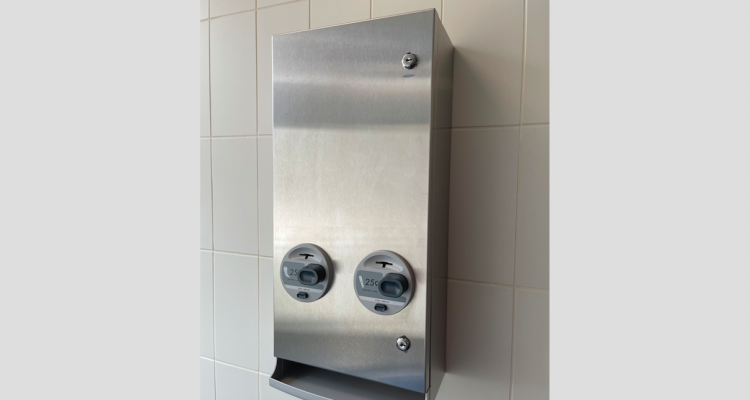FUSA Senator and President-Elect Tyler Heffern ‘22 is committed to seeing that change come to life during his time at Fairfield. Ever since Heffern was a FUSA Senator, he has been pushing for menstrual-product availability. The initiative started in 2019.
The conversation around menstruation and the complications that come with it is a taboo subject. However, many universities across the country have decided that it is time to break the stigma surrounding periods by providing free menstrual products in restrooms across their campuses. Several members of the Fairfield University Student Association believe that Fairfield University should be next to take action.
“We noticed a number of menstrual hygiene product dispensers were empty in public restrooms on campus,” Heffern said. “Some restrooms did not have dispensers at all.”
FUSA presented their initiative to implement more dispensers around campus to the Vice President for Student Life, Karen Donoghue, and the Vice President for Facilities Management, David Frassinelli. By the spring of 2020, dispensers that were already on campus were restocked, and by that summer, dispensers were placed in bathrooms in newer buildings like the Dolan School of Business and the Egan School of Nursing. Though this is just the beginning of FUSA’s menstrual product initiative.
FUSA Vice President-Elect Cailyn Fiori ‘22 stated, “Now that the dispensers have been stocked, our next step is to seek to improve the quality of the products in the dispensers.”
Free the Tampons was founded by Nancy Kramer in 2013 and works to advance restroom equality. The company defines restroom equality as, “The state of restrooms being equal and freely offering all of the necessities.” The organization believes tampons and sanitary pads are not luxury items or amenities; they are necessities and should be considered just as important as the stocking of toilet paper and hand soap.
In a study of 18 to 54-year-old women, conducted by Free the Tampons, 86 percent said they have started their period unexpectedly in public without the supplies they needed. 79 percent of those women said they have improvised with toilet paper to create a makeshift pad or tampon, and in their experience only eight percent of women said dispensers in public restrooms work every time.
Due to the pandemic, people are stocking up on toiletries and relying on unemployment insurance to buy their household necessities. Furthermore, hygiene products are not covered with food stamps or the Special Supplemental Nutrition Program for Women, Infants and Children, otherwise known as the WIC.
Heffern acknowledged this, “We also realize that cost can be a barrier for some students and so we have advocated for free menstrual hygiene products, an initiative that was started many years ago, and that continues today.”
So far, the only sort of pushback from administration has been associated with the cost of the project.
Heffern stated that, “As FUSA President and Vice President, [Fiori] and I will prioritize working with the administration to improve the quality of the products in dispensers and, if needed, work to acquire new dispensers that can hold these improved products.”
Part of FUSA’s initiative is working to get rid of the current cardboard applicators and replace them with better quality plastic applicator products.
Heffern also mentioned menstrual products have been made available on Fairfield’s campus in common areas like the John A. Barone Campus Center and DiMenna-Nyselius Library as well as most academic buildings. However, he would like to see dispensers implemented in residence halls as well.
Brown University’s student government began a pilot program, providing free menstrual products in all bathrooms (women’s, men’s, and gender neutral) in 2016. The president of Undergraduate Council of Students (UCS) Viet Nguyen, and six other student government representatives snuck through their campus at midnight to secretly fill bathrooms across campus with hygiene products. Since then, the UCS has tasked itself with replenishing the campus stock once a week, allocating funds in their budget to do so. Many universities have followed suit
If you are interested in learning more about this initiative or have any questions, concerns or suggestions, students can email fusa@fairfield.edu. Students are also welcome to drop a comment in the FUSA Comment Drop Box. Fiori said students can also come talk to them whenever they want; they are open to hearing students’ opinions and aim to be inclusive of all voices.


Leave a Reply